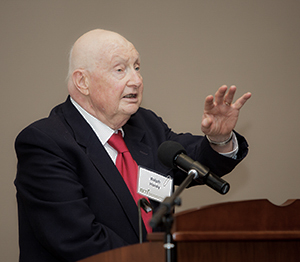
Many people knew biochemist Ralph W.F. Hardy by his work long before they ever met him. Hardy, who passed away peacefully earlier this month, was a pioneer in nitrogen fixation research and a leader in trying to bring the best science into public policy discussions related to agriculture and sustainability.
Hardy was well-known as a scientist for developing the acetylene reduction assay. It measures the activity of an enzyme that bacteria use to capture nitrogen from the air, as a method for measuring nitrogen fixation in the field. He was a leader in Life Sciences research at DuPont, then headed the Boyce Thompson Institute for Plant Research in Ithaca, NY.
In 1988 he co-founded the North American Agricultural Biotechnology Council, an organization primarily made up of research leaders at land grant universities. His goal was to provide a forum for discussing the interactions between new developments in biotechnology and agriculture. Hardy served as NABC president and guiding spirit from its founding until his death.
He was a terrific listener, a terrific advocate for good science, said Michael Kahn, a professor at Washington State University and 2015-2016 NABC chair. He felt it was very important to produce documents that described good science, and to have serious discussions about the various issues related to biotechnology.
As part of its activities, NABC sponsored provocative meetings and discussions that produced a set of highly relevant white papers and conference proceedings on such topics as the ethics and patenting of transgenic organisms, stewardship for the sustainability of genetically engineered crops and a vision of agricultural research and development for the 21st Century.
Similarly, the Alliance for Science was created in 2014 to support effective science communication in the use of biotechnology to address climate change and achieve sustainable agriculture and a safer, more secure food supply. Part of that vision and an extension of Hardy’s work calls for reducing agriculture’s impact on the environment, especially by improving crop yields without the extensive application of nitrogen fertilizers.
The nitrogen problem is one of the biggest contributors to agriculture’s footprint on climate, said Alliance for Science Director Sarah Evanega, who got her start as a plant science student in the field of nitrogen fixation.
The holy grail of nitrogen fixation research for many has always been to try to engineer non-leguminous plants to also be able to associate with nitrogen-fixing bacteria, including important crops like maize, which need immense amounts of nitrogen fertilizer, Evanega said.. The ENSA (Engineering Nitrogen Symbiosis for Africa) project is taking on that challenge in a big way, which is one reason why the Alliance is focusing on it in upcoming months as part of our ‘climate for change’ initiative.
In addition to emphasizing agriculture as it relates to climate change, the Alliance is actively building a global network of champions who are bringing science into discussions about biotechnology in their own communities. The 2016 cohort of Global Leadership Fellows arrives this week on the Ithaca campus.
The NABC leadership and Hardy’s family have encouraged memorial donations be directed to the Alliance for Science in recognition of its efforts, which align well with Hardy’s work as a scientist and science leader.
The possibility of using better science to improve agriculture was his passion, since agriculture is very resource-intensive and it is a fundamental human activity, Kahn said.
In life, and now death, Dr. Hardy is an inspiration for the Alliance for Science, Evanega said. We are deeply honored that donations in his memory will benefit our global communications work on behalf of agricultural biotechnology.
Ralph was dynamic and visionary, especially in the area of biotechnology, Kahn said. He had enthusiasm and he had a mission: Let’s get the good science out there for people to talk about. Let’s try to make it useful.
It’s a mission that will continue to be pursued by those who knew and respected Hardy and his pioneering work in the fields of biochemistry, physiology and agronomy.
